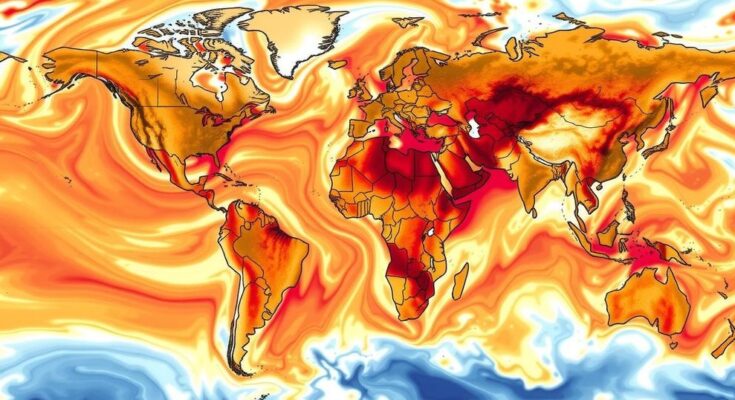The World Meteorological Organization (WMO) announced that 2024 is expected to be the hottest year on record, capping a decade of increasing global temperatures due to human activities. Catastrophic weather events have led to over 3,700 deaths this year, with extreme heat disproportionately affecting small islands and developing nations. UN leaders demand urgent action to reduce emissions and improve climate resilience, as current efforts fall short in addressing the crisis.
According to the World Meteorological Organization (WMO), the year 2024 is poised to be recorded as the hottest year globally, marking the culmination of a decade characterized by exceptional heat driven by human activities. “In my first year as WMO Secretary-General, I have issued repeated Red Alerts about the state of the climate,” stated Celeste Saulo, WMO Secretary-General. This year has witnessed catastrophic weather events, including unprecedented rainfall and resulting floods, leading to significant loss of life across various continents. Further compounding the struggles of many communities, tropical cyclones have exacted devastating human and economic costs, with Mayotte, a French overseas territory, being one of the most affected areas.
The WMO anticipated that its formal global temperature report would validate the observed extremes, with 2024 linked to at least 3,700 fatalities from disasters associated with climate change, including floods and wildfires, as noted by the scientific consortium, World Weather Attribution (WWA). Additionally, the report suggests an unsettling trend: extreme heat exposure has increased by an average of 41 days per person compared to pre-industrial levels. Particularly vulnerable are small island nations and developing countries, which often lack the necessary resources to mitigate these climate-induced challenges.
UN Secretary-General António Guterres emphasized the gravity of the situation, stating, “We have just endured a decade of deadly heat. The top ten hottest years on record have happened in the last ten years, including 2024.” He admonished that immediate action is crucial, urging countries to significantly reduce emissions and expedite the shift towards renewable energy by 2025.
The WMO’s findings indicate a troubling trajectory of human-induced warming, currently at 1.3°C, with predictions that global temperatures may temporarily exceed the 1.5°C threshold established in the Paris Agreement. Following the recent COP climate conference, which failed to instigate any new emission targets, the outlook for reversing these concerning trends seems grim. “Every fraction of a degree of warming matters, and increases climate extremes, impacts, and risks,” Saulo remarked, underscoring the necessity for nations to take decisive measures.
In a move to enhance monitoring efforts, the WMO is implementing the Global Greenhouse Gas Watch initiative to provide precise tracking of greenhouse gas concentrations. This aims to address data gaps and fortify efforts in mitigating climate change impacts. Furthermore, the UN advocates for improved early warning systems worldwide, alongside partnerships with agencies like the Asian Development Bank Institute to collect and leverage climate data effectively. This collective endeavor underscores the importance of proactive measures to protect communities vulnerable to climate extremes.
The article discusses the alarming projection by the World Meteorological Organization (WMO) that 2024 will be the hottest year on record, continuing a trend of increasing global temperatures primarily caused by human activities. This situation has led to record-breaking weather events and fatalities, highlighting the urgent need for international action to combat climate change. The background reflects the growing body of evidence linking climate change to extreme weather patterns and the socio-economic ramifications experienced by vulnerable populations around the world.
In summary, the year 2024 is anticipated to set a new record for global temperatures, exacerbated by ongoing human-induced climate change. The WMO highlights significant losses attributable to extreme weather events, while calls for immediate action are voiced by global leaders. The need for enhanced monitoring and early warning systems is critical in mitigating the impact of climate change, particularly in vulnerable regions. Collective and decisive action is essential to reverse the troubling trends and safeguard communities against the escalating climate crisis.
Original Source: healthpolicy-watch.news




